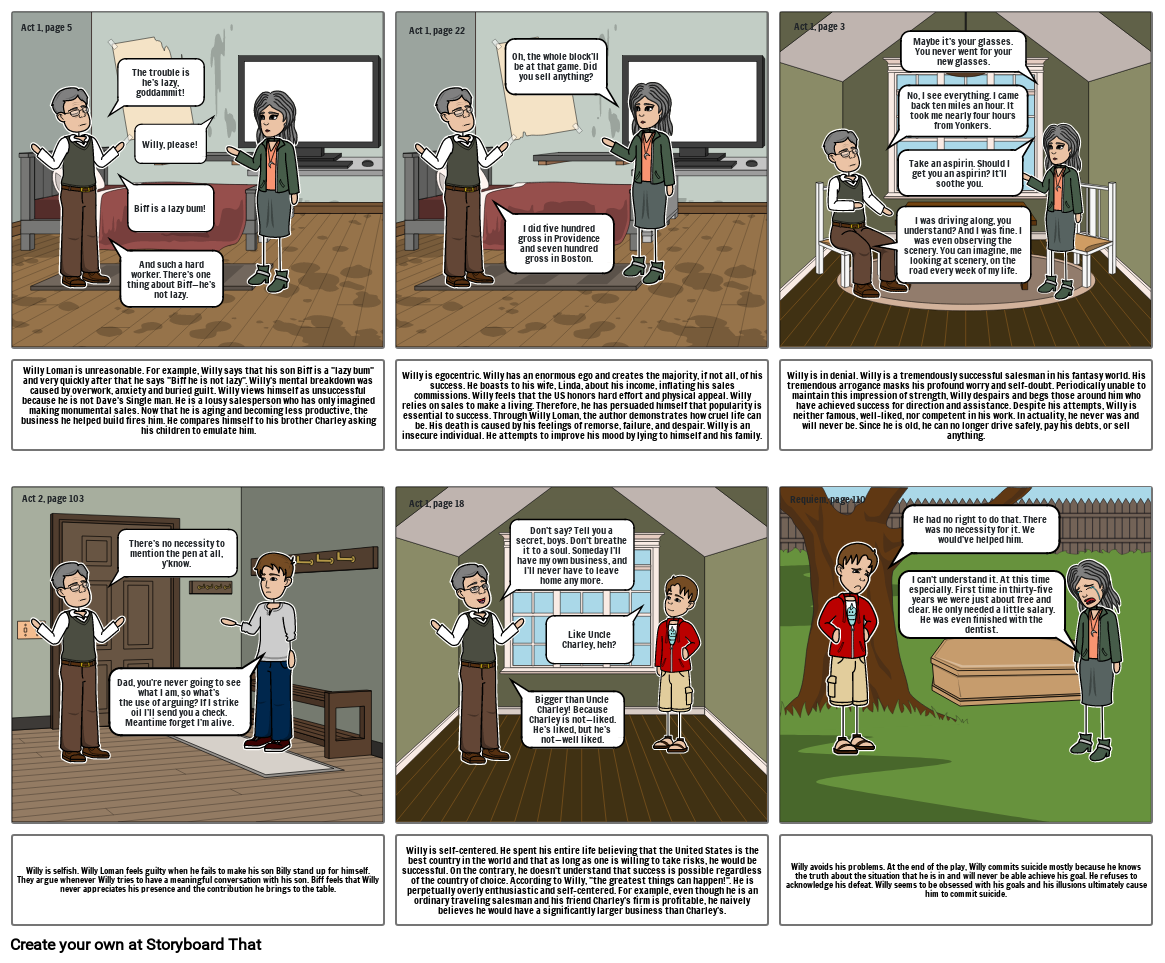Jeanell - english - Week 4 Activity 1: Storyboarding Willy Loman

Storyboard Tekst
- Act 1, page 5
- The trouble is he’s lazy, goddammit!
- And such a hard worker. There’s one thing about Biff—he’s not lazy.
- Biff is a lazy bum!
- Willy, please!
- Act 1, page 22
- I did five hundred gross in Providence and seven hundred gross in Boston.
- Oh, the whole block’ll be at that game. Did you sell anything?
- Act 1, page 3
- I was driving along, you understand? And I was fine. I was even observing the scenery. You can imagine, me looking at scenery, on the road every week of my life.
- No, I see everything. I came back ten miles an hour. It took me nearly four hours from Yonkers.
- Take an aspirin. Should I get you an aspirin? It’ll soothe you.
- Maybe it’s your glasses. You never went for your new glasses.
- Act 2, page 103
- Willy Loman is unreasonable. For example, Willy says that his son Biff is a lazy bum and very quickly after that he says Biff he is not lazy. Willy's mental breakdown was caused by overwork, anxiety and buried guilt. Willy views himself as unsuccessful because he is not Dave's Single man. He is a lousy salesperson who has only imagined making monumental sales. Now that he is aging and becoming less productive, the business he helped build fires him. He compares himself to his brother Charley asking his children to emulate him.
- There’s no necessity to mention the pen at all, y’know.
- Dad, you’re never going to see what I am, so what’sthe use of arguing? If I strike oil I’ll send you a check. Meantime forget I’m alive.
- Act 1, page 18
- Willy is egocentric. Willy has an enormous ego and creates the majority, if not all, of his success. He boasts to his wife, Linda, about his income, inflating his sales commissions. Willy feels that the US honors hard effort and physical appeal. Willy relies on sales to make a living. Therefore, he has persuaded himself that popularity is essential to success. Through Willy Loman, the author demonstrates how cruel life can be. His death is caused by his feelings of remorse, failure, and despair. Willy is an insecure individual. He attempts to improve his mood by lying to himself and his family.
- Don’t say? Tell you a secret, boys. Don’t breathe it to a soul. Someday I’ll have my own business, and I’ll never have to leave home any more.
- Bigger than Uncle Charley! Because Charley is not—liked. He’s liked, but he’s not—well liked.
- Like Uncle Charley, heh?
- Requiem, page 110
- Willy is in denial. Willy is a tremendously successful salesman in his fantasy world. His tremendous arrogance masks his profound worry and self-doubt. Periodically unable to maintain this impression of strength, Willy despairs and begs those around him who have achieved success for direction and assistance. Despite his attempts, Willy is neither famous, well-liked, nor competent in his work. In actuality, he never was and will never be. Since he is old, he can no longer drive safely, pay his debts, or sell anything.
- He had no right to do that. Therewas no necessity for it. We would’ve helped him.
- I can’t understand it. At this time especially. First time in thirty-five years we were just about free and clear. He only needed a little salary. He was even finished with the dentist.
- Willy is selfish. Willy Loman feels guilty when he fails to make his son Billy stand up for himself. They argue whenever Willy tries to have a meaningful conversation with his son. Biff feels that Willy never appreciates his presence and the contribution he brings to the table.
- Willy is self-centered. He spent his entire life believing that the United States is the best country in the world and that as long as one is willing to take risks, he would be successful. On the contrary, he doesn’t understand that success is possible regardless of the country of choice. According to Willy, the greatest things can happen!. He is perpetually overly enthusiastic and self-centered. For example, even though he is an ordinary traveling salesman and his friend Charley's firm is profitable, he naively believes he would have a significantly larger business than Charley's.
- Willy avoids his problems. At the end of the play, Willy commits suicide mostly because he knows the truth about the situation that he is in and will never be able achieve his goal. He refuses to acknowledge his defeat. Willy seems to be obsessed with his goals and his illusions ultimately cause him to commit suicide.
Izrađeno više od 30 milijuna scenarija

